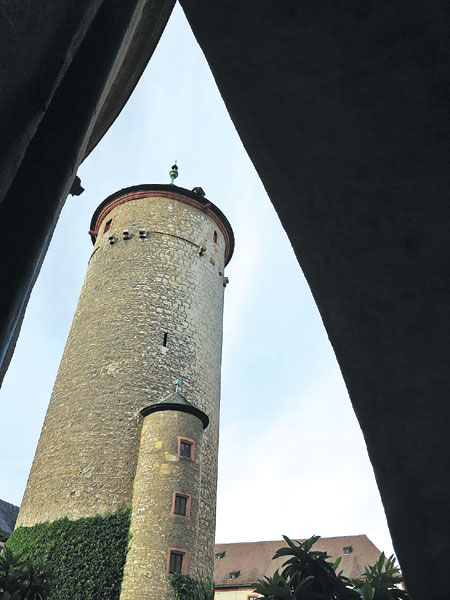Let time go by in romantic Wuerzburg
 |
|
A watchtower recalls the medieval functions of Fortress Marienberg. |
A trip to a foreign country is often full of drama and uncertainty. But my visit to southern Germany is different.
The flights were on time, and so were our guides and cars.
Related: Fog-covered countryside residences in Huangshan
The traffic is occasionally heavy, but never jammed. Hotel rooms are clean and cozy. Substantial meals are served with wine that is varied and excellent. In mid-autumn, leaves are colorful, the air is fresh and crisp, and the scenery consistently charming.
During our one-week trip, we stayed in Wuerzburg, in the federal state of Bavaria, for three days. That was plenty of time to explore the historical city with its compact center, a chance to truly know and savor the place at ease.
We visited Fortress Marienberg twice, because it was too rainy on our first stop to catch the promised panoramic view of the city center.
The heavily walled fortress on the Main River has overlooked Wuerzburg since the city's prince-bishop commissioned a castle in 1201.
Since the foundation of the Wuerzburg bishopric in 742, Wuerzburg has been the religious center of the region. Baroque towers and domes of churches and cathedrals dominate the skyline of the old part of the city.
The fortress' residential wing houses the city's history museum, and the nearby Baroque armory displays works with exquisite faces by renowned sculptor and woodcarver Tilman Riemenschneider (1460-1531).
For me, the other interesting exhibits are ancient weapons. There is a rifle made in 1680, with a weight of 15.5 kilograms, and a sword 1.8 meters long. It's no surprise that the castle was only taken once, by Swedish troops.
The Residence, former palace of the city's prince-bishops, is a splendid Baroque edifice, built by famous architect Balthasar Neumann (1687-1753) and declared a UNESCO World Cultural Heritage site in 1981.
Inside, a fresco called The Four Continents, by Venetian Giovanni Battista Tiepolo, is said to be the world's largest above a staircase. It features vivid images of local people and wildlife from Europe, Africa, Asia and America.
The fresco was one of a few ancient relics or buildings that survived World War II intact. A 17-minute air raid on Wuerzburg by British on March 16, 1945 destroyed 90 percent of the town. More than 30,000 buildings were consumed in flames, including all of the city's churches, cathedrals and other monuments, and 5,000 people died.
Over the past 20 years, historic buildings were accurately replicated, and while I wandered around the old town and enjoyed all of the "old" buildings, I felt a sense of admiration and awe.
Wuerzburg is the gateway to the Romantic Road, one of Germany's popular holiday routes, leading to the most picturesque towns in Bavaria and the eastern fringes of Baden-Wuerttemberg state.
Volkach is clean and laidback, with many visitors dining or drinking in restaurants around a small town square. Not far from the town, a lookout on a hill offers visitors panoramic views into the Franconian wine country curved through by the Main River.
Iphofen is even smaller, but has a complete moat, city walls and four entrances. Along the moat, a wooded trail encircling the town has created a perfect route for visitors to explore the town.
Then we arrived at Stuttgart, where the Mercedes-Benz Museum is really fascinating. So many shining vehicles and so many "firsts" created by the German manufacturer are on display.
Our last stop is Radolfzell, a town facing Bodensee, or Lake Constance, Central Europe's third largest lake - shared by Germany, Switzerland and Austria.
Floating on the lake on a solar-boat, we were told that the lake had been strongly polluted until the 1970s. But the quality of the lake's water has steadily improved, and today it provides drinking water to about 4 million people in southern Germany.
Our waterfront hotel, 20 minutes walk from the town center, has views of snow-capped Swiss peaks looming on the horizon and a placid lake dotted with swans, coots and mallard ducks as well as yachts and canoes. It is so peaceful, and perfect for a hike, bike ride or walk.
chenliang@chinadaily.com.cn




















